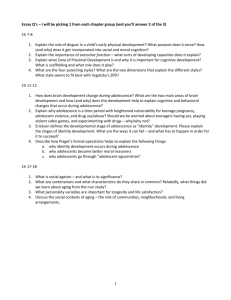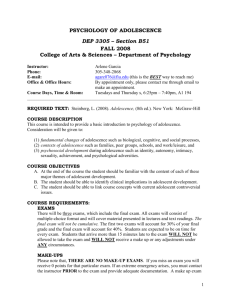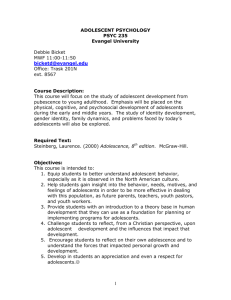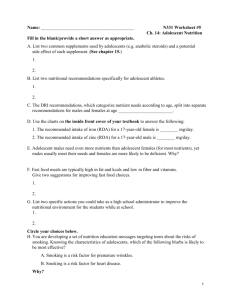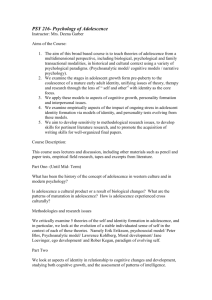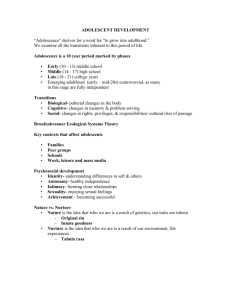dep 3305 psychology of adolescence
advertisement
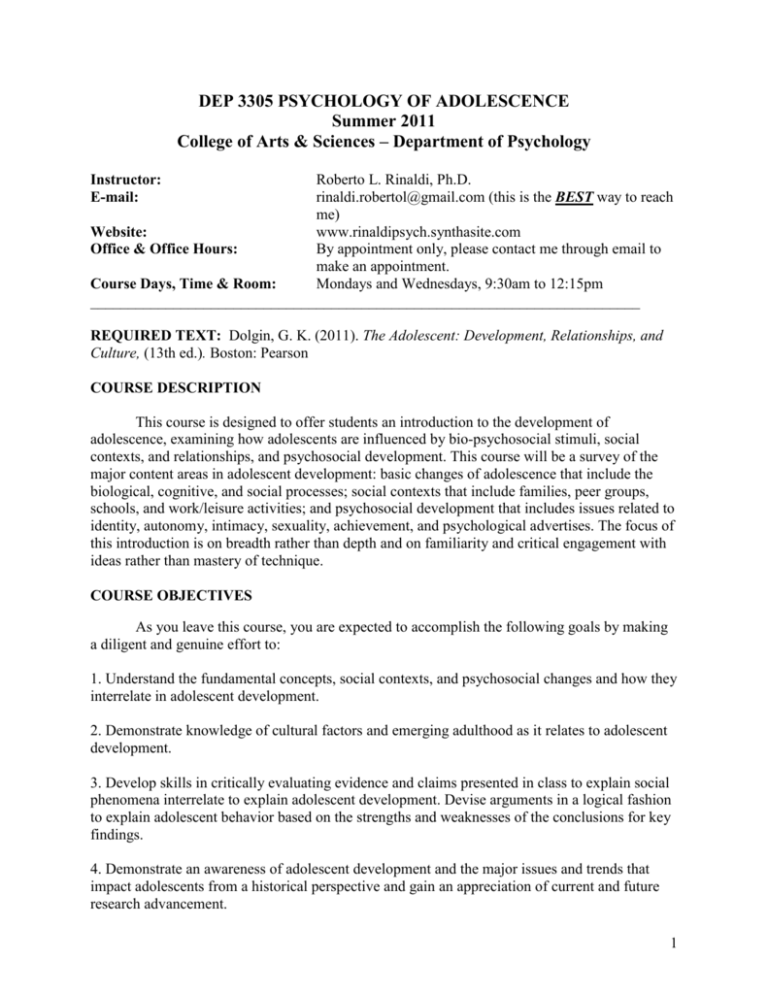
DEP 3305 PSYCHOLOGY OF ADOLESCENCE Summer 2011 College of Arts & Sciences – Department of Psychology Instructor: E-mail: Roberto L. Rinaldi, Ph.D. rinaldi.robertol@gmail.com (this is the BEST way to reach me) Website: www.rinaldipsych.synthasite.com Office & Office Hours: By appointment only, please contact me through email to make an appointment. Course Days, Time & Room: Mondays and Wednesdays, 9:30am to 12:15pm _________________________________________________________________________ REQUIRED TEXT: Dolgin, G. K. (2011). The Adolescent: Development, Relationships, and Culture, (13th ed.). Boston: Pearson COURSE DESCRIPTION This course is designed to offer students an introduction to the development of adolescence, examining how adolescents are influenced by bio-psychosocial stimuli, social contexts, and relationships, and psychosocial development. This course will be a survey of the major content areas in adolescent development: basic changes of adolescence that include the biological, cognitive, and social processes; social contexts that include families, peer groups, schools, and work/leisure activities; and psychosocial development that includes issues related to identity, autonomy, intimacy, sexuality, achievement, and psychological advertises. The focus of this introduction is on breadth rather than depth and on familiarity and critical engagement with ideas rather than mastery of technique. COURSE OBJECTIVES As you leave this course, you are expected to accomplish the following goals by making a diligent and genuine effort to: 1. Understand the fundamental concepts, social contexts, and psychosocial changes and how they interrelate in adolescent development. 2. Demonstrate knowledge of cultural factors and emerging adulthood as it relates to adolescent development. 3. Develop skills in critically evaluating evidence and claims presented in class to explain social phenomena interrelate to explain adolescent development. Devise arguments in a logical fashion to explain adolescent behavior based on the strengths and weaknesses of the conclusions for key findings. 4. Demonstrate an awareness of adolescent development and the major issues and trends that impact adolescents from a historical perspective and gain an appreciation of current and future research advancement. 1 TEACHING METHODS This course is organized so that the lecture and readings of this course function together. I am expecting everyone to engage in lively discussions and activities. Class time will be formatted to expound on the readings by emphasizing points, addressing questions, initiating discussion, and applying principles highlighted in the text. It is your responsibility to read and understand all of the assigned readings and not just those we discuss in class. COURSE REQUIREMENTS CLASS PARTICIPATION/ATTENDANCE Participation and attendance are welcomed and encouraged. Participation includes contributing knowledgeably to discussions. A few group rules are helpful, especially if the class is large. (1) Everyone has a chance to participate. Feel free to ask questions or join in. (2) No “side talk,” it is very distracting to people trying to listen or talk. (3) No “put-downs,” everyone is entitled to their opinion and deserves respect. Students are expected to attend every class session. Punctuality in attending classes is expected, as is the timely submission of class assignments and prompt attendance at meetings scheduled outside of class. In accordance with these guidelines, students are expected to recognize that the use of wireless internet during class for the purposes of sending personal emails, surfing the internet, or using web-access for non-class related reasons will have a negative impact on class participation grade. EXAMS There will be two exams, which includes the final exam. All exams will consist of multiple-choice format and will cover material presented in lectures and text readings. The final exam will not be cumulative. The two exams will account for 25% (each) of your final grade. Students are expected to be on time for every exam. Students that arrive more than 15 minutes late to the exam WILL NOT be allowed to take the exam and WILL NOT receive a make up or any adjustments under ANY circumstances. If you miss an exam for reasons related to a documented, FIU sanctioned activities (i.e., military obligations, jury duty, religious days, illness, serious family emergencies, or participation in official university activities of athletic events, performances, etc.), an alternative arrangement will be made in which the final exam will be doubled. This arrangement will only be offered depending on the nature of the emergency (i.e., personal sickness, death, athletic events) and the provision of appropriate documentation within one day of the posted exam date. If you miss an exam for another reason, you will not have the opportunity to retake it. 2 ASSIGNMENTS Personal Reflection Paper. This activity will give you the opportunity to better understand your own “story” as you reflect on your adolescence experience during ages 13-16. This assignment is worth 25% of your final grade. This report is to be five to six pages in length (double spaced, 12 font). No emailed or late assignments will be accepted. It is to include the following information with the bolded words used as headings: General Thoughts during My Adolescence Physical Development during your adolescence Temperament and Emotional Characteristics Most Embarrassing Event of your adolescence Spiritual/Moral Development during your adolescence Top Conflict I Faced with My Family Top Conflict I Faced with My Peers The way I Dealt with Conflict During My Adolescence Any other information about yourself that you would like to include Group/Individual Paper and Presentation. You will be required to complete a group project (five students maximum per group) examining a current issue in adolescent development. The project involves each member of the group summarizing one empirical article and together giving a Power Point presentation in which the group provides recommendations for public policy based on the research findings. You are required to complete an individual written presentation. You will use articles from acceptable empirical journals. Since these are empirical articles, this endeavor will require a library trip. Be sure to list your resources (you should have as many sources as there are members in your group). This assignment is worth 25% of your final grade. This report is to be five to six pages in length (double spaced, 12 font and in APA format). No emailed or late assignments will be accepted. Suggested Topics Abortion Gender Issues Substance abuse Peer pressure Cliques Alcohol abuse Latchkey Youth Test anxiety Aggression Juvenile delinquency Shoplifting Bullying Suicide Grief Self-esteem Drunk driving Underage drinking Self-mutilation Gangs ADHD Learning disabilities Learning styles STIs Obesity Anorexia nervosa Bulimia Body image Smoking Personality traits Athletics Parenting styles Emotional intelligence Physical development Emotional development Social development Moral development Social isolates School failure Parent relationships Sexual abuse Friendships Ethnicity Leisure activities 3 Gender differences Working Homosexuality Poverty Popularity Dating Shyness Depression Television viewing Violence in schools Violence in dating Violence in media ACADEMIC INTEGRITY Read the section on Academic Conduct in the Annual Student Handbook with great care. The expectations of academic integrity are central to the intellectual liveliness and standards of this academic community. As a student, you have a responsibility to be honest and to respect the ethical standards of the academic community. In addition to maintaining academic honesty on all written assignments, students are expected to demonstrate an ability to function independently, earnestly participate in activities that are pursuant to professional development, and carry through and complete assigned tasks. These standards are designed to ensure the integrity of your education and of the evaluation process. You will have violated these standards if you: Refer to unauthorized materials. Provide unauthorized assistance. Receive unauthorized assistance. Possess, buy, sell, copy, or use unauthorized materials (in other words, don’t buy a draft of your assignments or final project from a “paper mill”). Act as or use a substitute in an evaluation setting (in other words, although you may work in pairs or small groups, do not write an assignment for someone else, or have someone write an assignment for you). Present as your own, for academic evaluation, the ideas or words of another person without proper acknowledgement and citation of sources (in other words, don't plagiarize). If caught cheating on an examination, you will be asked to leave and will receive a “0”. If caught cheating on the final examination, you will receive an “F” for the course. OTHER CLASS POLICIES We all have different learning styles. If you qualify for a disability accommodation, please let me know ahead of time so that we can work together so that the proper adjustments can be made. Specific accommodations can be made for those are visually or hearing impaired, diagnosed with learning disabilities, or simply those who have creative learning styles. Please contact the Disability Resource Center (305-919-5345) if you think you qualify so that you can be provided with the services you need to maximize your ability to learn. If you need assistance with dealing with problems, I strongly encourage you to contact the FIU Counseling Center (305-348- 2434/305-919-5305). I want to make this experience an equally inviting and inclusive environment for all of my students. 4 COURSE GRADE Requirement Exams (2) Assignments (2) Participation Total Points Points will be based on the FIU Grading system Grades A AB+ B BC+ C CD+ D DF Points 25 25 Extra Credit Total 50 50 Extra Credit 100 Definition Excellent Grade Points 94-100 90-93 87-89 84-86 80-83 77-79 74-76 70-73 67-69 64-66 60-63 59-0 Good Average Poor Failure Final grades will ultimately be at the discretion of the instructor. Points can be adjusted for weaknesses and strengths that are demonstrated in the area of professional behavior. COURSE OUTLINE Disclaimer: This is a tentative course outline/schedule that is subject to change. Your understanding and flexibility are greatly appreciated. DATE Week 1 Week 2 Week 3 Week 4 Week 5 Week 6 Week 7 READINGS & TOPICS Introductions, Overview of Course, Chapters 1 & 2 Chapters 4, 5, 6, & 7/Midterm Review Midterm Exam/Chapters 8 & 10 NO CLASS MAY 30th, Chapters 11 & 12 Chapters 13, 14, & 15 Group Presentations, Assignments Due (June 13th), & Final Exam Review Group Presentations & Final Exam 5
